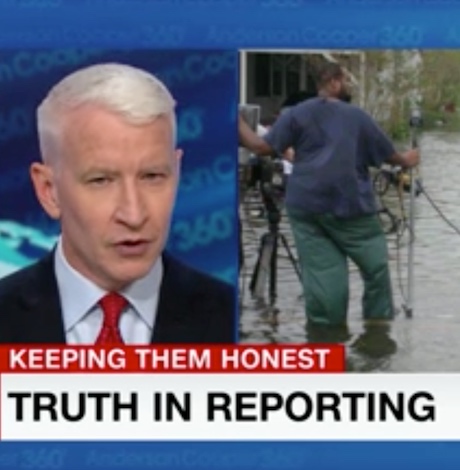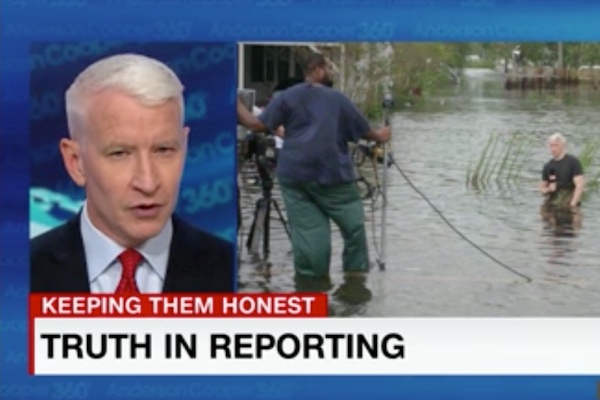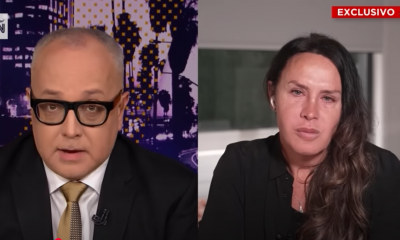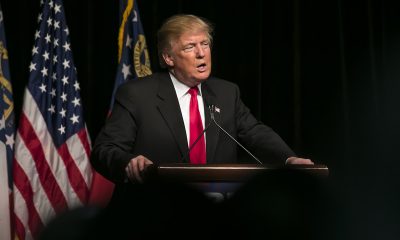News
Anderson Cooper debunks hurricane conspiracy photo tweeted by Donald Trump Jr.
The CNN anchor says the picture was taken in 2008


Anderson Cooper (Screenshot via YouTube)
Anderson Cooper devoted nearly 10 minutes of his live CNN broadcast on Monday to debunking a hurricane conspiracy photo that was shared by Donald Trump Jr.
“It’s a shame that CNN’s ratings are down 41%. What’s worse is there’s a simple solution that they refuse to accept. Stop Lying to try to make @realDonaldTrump look bad,” Trump Jr. tweeted along with a photo which shows Cooper standing waist-deep in water while filming a report for CNN. A crew member is seen standing above him in much shallower water.
It’s a shame that CNN’s ratings are down 41%. What’s worse is there’s a simple solution that they refuse to accept. Stop Lying to try to make @realDonaldTrump look bad. https://t.co/O3XyWchsJh pic.twitter.com/BCUCxKnOvO
— Donald Trump Jr. (@DonaldJTrumpJr) September 16, 2018
Gavin J. Smith, a former Trump Administration official, also tweeted out the photo writing “Absolutely disgraceful! Apparently #HurricaneFlorence wasn’t devastating enough for @CNN’s @andersoncooper — so he had to exaggerate for his live shot. #FakeNews at its finest!”
Absolutely disgraceful! Apparently #HurricaneFlorence wasn’t devastating enough for @CNN’s @andersoncooper — so he had to exaggerate for his live shot. #FakeNews at its finest! pic.twitter.com/9pUJ6Ulgqf
— Gavin J. Smith (@iamgavinjames) September 15, 2018
The photo has become a meme for right-wingers on social media.
“I usually let conspiracy theorists go unanswered,” Cooper says before listing the theories that he faked reporting on Sandy Hook and that he used a boy as a shield in Haiti.
Cooper slammed Trump Jr. saying “I know he considers himself an outdoorsman and pays a lot of money to be led to wildlife in Africa that he then kills. But I’m not sure if he’s ever actually been to a hurricane or a flood.”
“I didn’t see him down in North Carolina the last few days helping out, lending a hand,” he went on. “But I’m sure he was busy doing something important besides just tweeting lies.”
Cooper explained that the photo was not taken during Hurrican Florence but during his coverage of Hurricane Ike in 2008.
“I’ve covered hurricanes for about 14 years and it really does make me sad to think that anyone would believe that I would try to fake something or overly dramatize a disaster,” Cooper says.
He breaks down the logistics of filming the segment saying that he chose to stand off the road in deeper water to both demonstrate the height of the water and to keep off the road and out of the way of rescue vehicles. He also plays clips from the segment that show Cooper walking into the flood waters.
“The idea that I am kneeling in water to make it look deep is frankly, idiotic,” Cooper says.
Cooper also notes that the photo isn’t from Hurricane Florence because the crew member seen in the photo is CNN audio tech Doug Thomas who died in September 2007.
“The idea I am kneeling in water to make it look deep is idiotic.” @AndersonCooper debunks the lies being spread by Donald Trump Jr., and others who falsely claimed he and his team exaggerated the severity of Hurricane Florence. #KeepingThemHonest https://t.co/j2HptrYpe0 pic.twitter.com/zwfvIXCsIY
— Anderson Cooper 360° (@AC360) September 18, 2018
Trump Jr. responded on Twitter saying that he never claimed the photo was from Hurricane Florence.
“If you’re going to spend 10 minutes crying about a meme you may want to make sure you’re actually right. Good article as it shows exactly what CNN does daily to sell false truth,” Trump Jr. writes. “CNN doing what they do best. Crying & Lying.@AC360 says I said it was a pic from Florence. Isaid no such thing.’evidence’ CNN provided doesn’t even reference Florence. You guys can’t even fact check a meme. The illusion created by the pic is illustrative of the bs you sell!”
If you’re going to spend 10 minutes crying about a meme you may want to make sure you’re actually right. Good article as it shows exactly what CNN does daily to sell false truth. https://t.co/dp9W5SNxUG
— Donald Trump Jr. (@DonaldJTrumpJr) September 18, 2018
CNN doing what they do best.
Crying & Lying.@AC360 says I said it was a pic from Florence
Isaid no such thing.“evidence” CNN provided doesn’t even reference Florence. You guys can’t even fact check a meme.
The illusion created by the pic is illustrative of the bs you sell! https://t.co/wnRSns1Thf
— Donald Trump Jr. (@DonaldJTrumpJr) September 18, 2018
Maryland
LGBTQ suicide prevention hotline option is going away. Here’s where else to go in Md.
Changes will take effect July 17

By ANNA RUBENSTEIN | The national suicide prevention hotline will no longer offer specialized support to LGBTQ people, starting July 17, the Trump administration announced last week.
Dialing the hotline at 988 will still be available for crisis support. But callers will no longer be able to reach specific LGBTQ services by pressing Option 3. The change worries advocates because their data shows the LGBTQ community has a disproportionally high suicide rate.
Even after the option ends, here’s how to receive tailored support if you’re in Maryland.
The rest of this article can be found on the Baltimore Banner’s website.
New York
Two teens shot steps from Stonewall Inn after NYC Pride parade
One of the victims remains in critical condition

On Sunday night, following the annual NYC Pride March, two girls were shot in Sheridan Square, feet away from the historic Stonewall Inn.
According to an NYPD report, the two girls, aged 16 and 17, were shot around 10:15 p.m. as Pride festivities began to wind down. The 16-year-old was struck in the head and, according to police sources, is said to be in critical condition, while the 17-year-old was said to be in stable condition.
The Washington Blade confirmed with the NYPD the details from the police reports and learned no arrests had been made as of noon Monday.
The shooting took place in the Greenwich Village neighborhood of Manhattan, mere feet away from the most famous gay bar in the city — if not the world — the Stonewall Inn. Earlier that day, hundreds of thousands of people marched down Christopher Street to celebrate 55 years of LGBTQ people standing up for their rights.
In June 1969, after police raided the Stonewall Inn, members of the LGBTQ community pushed back, sparking what became known as the Stonewall riots. Over the course of two days, LGBTQ New Yorkers protested the discriminatory policing of queer spaces across the city and mobilized to speak out — and throw bottles if need be — at officers attempting to suppress their existence.
The following year, LGBTQ people returned to the Stonewall Inn and marched through the same streets where queer New Yorkers had been arrested, marking the first “Gay Pride March” in history and declaring that LGBTQ people were not going anywhere.
New York State Assemblywoman Deborah Glick, whose district includes Greenwich Village, took to social media to comment on the shooting.
“After decades of peaceful Pride celebrations — this year gun fire and two people shot near the Stonewall Inn is a reminder that gun violence is everywhere,” the lesbian lawmaker said on X. “Guns are a problem despite the NRA BS.”
India
Anaya Bangar challenges ban on trans women in female cricket teams
Former Indian cricketer Sanjay Bangar’s daughter has received support

Anaya Bangar, the daughter of former Indian cricketer Sanjay Bangar, has partnered with the Manchester Metropolitan University Institute of Sport in the U.K. to assess her physiological profile following her gender-affirming surgery and undergoing hormone replacement therapy.
From January to March 2025, the 23-year-old underwent an eight-week research project that measured her glucose levels, oxygen uptake, muscle mass, strength, and endurance after extensive training.
The results, shared via Instagram, revealed her metrics align with those of cisgender female athletes, positioning her as eligible for women’s cricket under current scientific standards. Bangar’s findings challenge the International Cricket Council’s 2023 ban on transgender athletes in women’s cricket, prompting her to call for a science-based dialogue with the Board of Control for Cricket in India and the ICC to reform policies for transgender inclusion.
“I am talking with scientific evidence in my hand,” Bangar said in an interview posted to her Instagram page. “So, I hope, this makes an impact and I will be hoping to BCCI and ICC talking with me and discussing this further.”
On Nov. 21, 2023, the ICC enacted a controversial policy barring trans women from international women’s cricket. Finalized after a board meeting in Ahmedabad, India, the regulation prohibits any trans player who has experienced male puberty from competing, irrespective of gender-affirming surgery or hormone therapy. Developed through a 9-month consultation led by the ICC’s Medical Advisory Committee, the rule aims to safeguard the “integrity, safety, and fairness” of women’s cricket but has drawn criticism for excluding athletes like Canada’s Danielle McGahey, the first trans woman to play internationally. The policy, which allows domestic boards to set their own rules, is slated for review by November 2025.
Bangar shared a document on social media verifying her participation in a physiological study at the Manchester Metropolitan University Institute of Sport, conducted from Jan. 20 to March 3, 2025, focused on cricket performance. The report confirmed that her vital metrics — including haemoglobin, blood glucose, peak power, and mean power — aligned with those of cisgender female athletes. Initially, her fasting blood glucose measured 6.1 mmol/L, slightly above the typical non-diabetic range of 4.0–5.9 mmol/L, but subsequent tests showed it normalized, reinforcing the study’s findings that her physical profile meets female athletic standards.
“I am submitting this to the BCCI and ICC, with full transparency and hope,” said Bangar. “My only intention is to start a conversation based on facts not fear. To build space, not divide it.”
In a letter to the BCCI and the ICC, Bangar emphasized her test results from the Manchester Metropolitan University study. She explained that the research aimed to assess how hormone therapy had influenced her strength, stamina, haemoglobin, glucose levels, and overall performance, benchmarked directly against cisgender female athletic standards.
Bangar’s letter to the BCCI and the ICC clarified the Manchester study was not intended as a political statement but as a catalyst for a science-driven dialogue on fairness and inclusion in cricket. She emphasized the importance of prioritizing empirical data over assumptions to shape equitable policies for trans athletes in the sport.
Bangar urged the BCCI, the world’s most influential cricket authority, to initiate a formal dialogue on trans women’s inclusion in women’s cricket, rooted in medical science, performance metrics, and ethical fairness. She called for the exploration of eligibility pathways based on sport-specific criteria, such as haemoglobin thresholds, testosterone suppression timelines, and standardized performance testing. Additionally, she advocated for collaboration with experts, athletes, and legal advisors to develop policies that balance inclusivity with competitive integrity.
“I am releasing my report and story publicly not for sympathy, but for truth. Because inclusion does not mean ignoring fairness, it means measuring it, transparently and responsibly,” said Bangar in a letter to the BCCI. “I would deeply appreciate the opportunity to meet with you or a representative of the BCCI or ICC to present my findings, discuss possible policy pathways, and work towards a future where every athlete is evaluated based on real data, not outdated perceptions.”
Before her transition, Bangar competed for Islam Gymkhana in Mumbai and Hinckley Cricket Club in the U.K., showcasing her talent in domestic cricket circuits. Her father, Sanjay Bangar, was a dependable all-rounder for the Indian national cricket team from 2001 to 2004, playing 12 test matches and 15 One Day Internationals. He later served as a batting coach for the Indian team from 2014 to 2019, contributing to its strategic development.
Cricket in India is a cultural phenomenon, commanding a fanbase of more than 1 billion, with more than 80 percent of global cricket viewership originating from the country.
The International Cricket Council, the sport’s governing body, oversees 12 full member nations and more than 90 associate members, with the U.S. recently gaining associate member status in 2019 and co-hosting the 2024 ICC Men’s T20 World Cup. The BCCI generated approximately $2.25 billion in revenue in the 2023–24 financial year, primarily from the Indian Premier League, bilateral series, and ICC revenue sharing. The ICC earns over $3 billion from media rights in India alone for the 2024–27 cycle, contributing nearly 90 percent of its global media rights revenue, with the BCCI receiving 38.5 percent of the ICC’s annual earnings, approximately $231 million per year.
Women’s cricket in India enjoys a growing fanbase, with over 300 million viewers for the Women’s Premier League in 2024, making it a significant driver of the sport’s global popularity. The International Cricket Council oversees women’s cricket in 12 full member nations and over 90 associate members, with the U.S. fielding a women’s team since gaining associate status in 2019 and competing in ICC events like the 2024 Women’s T20 World Cup qualifiers. The BCCI invests heavily in women’s cricket, allocating approximately $60 million annually to the WPL and domestic programs in 2024–25, while contributing to the ICC’s $20 million budget for women’s cricket development globally. India’s media market for women’s cricket, including WPL broadcasting rights, generated $120 million in 2024, accounting for over 50 percent of the ICC’s women’s cricket media revenue.
“As a woman, I feel when someone says that they are women, then they are, be trans or cis. A trans woman is definitely the same as a cis woman emotionally and in vitals, and specially, when someone is on hormone replacement therapy. Stopping Anaya Bangar from playing is discrimination and violation of her rights. It is really sad and painful that every transwoman need to fight and prove their identity everywhere,” said Indrani Chakraborty, an LGBTQ rights activist and a mother of a trans woman. “If ICC and BCCI is stopping her from playing for being transgender, then I will say this to be their lack of awareness and of course the social mindsets which deny acceptance.”
Chakraborty told the Blade that Bangar is an asset, no matter what. She said that the women’s cricket team will only benefit by participation, but the discriminating policies are the hindrance.
“Actually the transgender community face such discrimination in every sphere. In spite of being potent, they face rejection. This is highly inhuman. These attitudes is regressive and will never let to prosper. Are we really in 2025?,” said Chakraborty. “We, our mindset and the society are the issues. We, as a whole, need to get aware and have to come together for getting justice for Anaya. If today, we remain silent, the entire community will be oppressed. Proper knowledge of gender issues need to be understood.”
The BCCI and the International Cricket Council have not responded to the Blade’s repeated requests for comment.
-

 U.S. Supreme Court4 days ago
U.S. Supreme Court4 days agoSupreme Court upholds ACA rule that makes PrEP, other preventative care free
-

 U.S. Supreme Court4 days ago
U.S. Supreme Court4 days agoSupreme Court rules parents must have option to opt children out of LGBTQ-specific lessons
-

 Congress5 days ago
Congress5 days agoSenate parliamentarian orders removal of gender-affirming care ban from GOP reconciliation bill
-

 District of Columbia5 days ago
District of Columbia5 days agoMan sentenced to 15 years in prison for drug deal that killed two DC gay men












